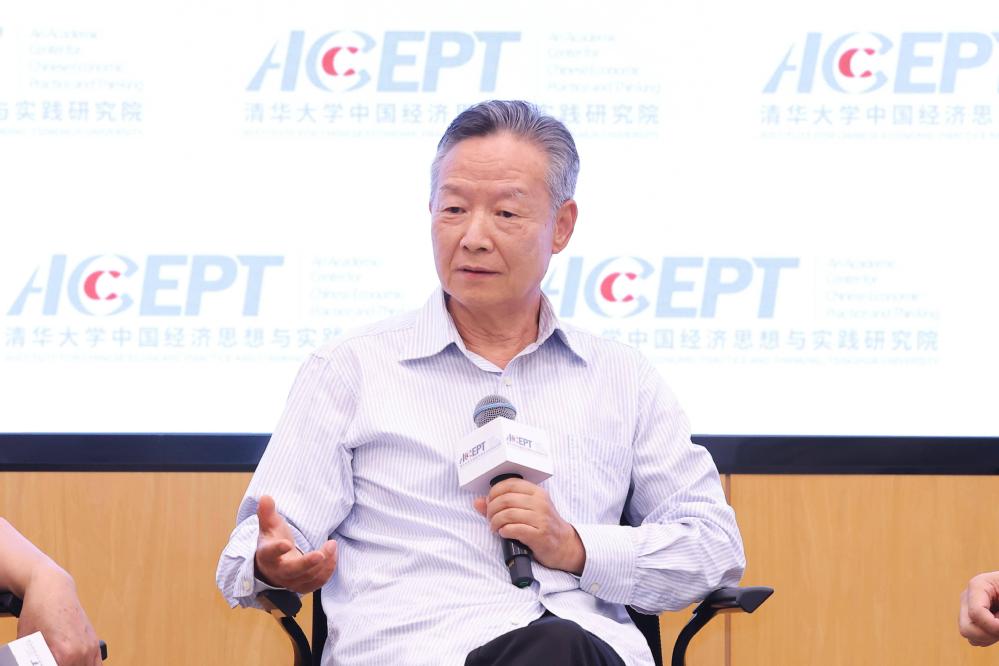Qiu Baoxing: Establish a classification support system to transform the supply ecosystem for "quality housing"
The following is a summary of Qiu Baoxing's comments during a roundtable discussion at the 49th Tsinghua University Forum on China and the World Economy held at Tsinghua University, Beijing, and broadcasted online on July 2, 2025. Qiu is an Academician of the China Science Center of the International Eurasian Academy of Sciences and former Vice Minister of the Ministry of Housing and Urban-Rural Development of the People's Republic of China.
On July 2, 2025, the 49th Tsinghua University Forum of China and the World Economy, hosted by Tsinghua University's Academic Center for Chinese Economic Practice and Thinking (ACCEPT) in partnership with the university's School of Social Sciences, was broadcasted online under the theme of "China's 2025 Mid-Year Economic Update." Academician of the China Science Center of the International Eurasian Academy of Sciences and former Vice Minister of the Ministry of Housing and Urban-Rural Development of the People's Republic of China, Qiu Baoxing, participated in a roundtable discussion at the forum alongside other distinguished guests where he commented on the latest developments in China's real estate sector.

Qiu noted that there is still ample room left for China to implement policies to regulate and control the real estate sector, with the country's institutional advantages concentrated and embodied in its harmonized system for coordinating regulations and controls between central and local governments. Compared with the structural limitations placed on the private land tenure system in Western countries, China has granted its local governments with certain functions as investment entities, which has led to the creation of a policy multiplier effect through a mechanism for redistributing the gains from land use. At present, there is an urgent need to systematically improve abilities to apply policy tools, including solving the problem of path dependency among some local governments. On the issue of liquidating housing stock, the model for supplying affordable housing has already laid the groundwork necessary for purchasing and stockpiling converted residential units, although there are three obstacles that must be overcome before proceeding to implementation. First, the lack of a market-orientated pricing mechanism generates a conflict between the goals of preserving asset values on the one hand and liquidating excess housing stock on the other hand. Second, the local-level housing development system suffers from functional inertia as a result of its tendency to overvalue new construction and undervalue revitalization. Third, there are institutional gaps that remain for transforming the commercial real estate sector.
He pointed out that the real estate market is currently at a stage of undergoing structural readjustment, with the momentum behind the reorganization and restructuring of real estate developers having become increasingly more evident. The policy guidance will focus on cultivating first-rate property developers with a capacity for product innovation, while transforming the supply ecosystem for “quality housing” through the establishment of a classification support system. The key to innovating on financing mechanisms is to guide real estate developers and local government financing vehicles to institute a collaborative model of “asset-light operations + special-bond financing,” which can effectively ameliorate the problem of financial institutions engaging in credit discrimination against real estate enterprises. From the perspective of long-term dynamism and freeing up liquidity, it is necessary to focus on activating financing engines that comprise the three following major components: first, establish a cross-regional circulation mechanism for social security to tap into the potential housing consumption of 100 million members of the migrant population; second, innovate on the model for the voluntary reconstruction of older communities, including by leveraging social capital with a policy of extending the term length for property rights and compensating for any changes in the floor area ratio; third, develop the long-term rental market for rural housing, utilizing the “20+10” lease system and rent control mechanisms to protect the rights and interests of residents, which is expected to drive an average annual investment of 4 trillion yuan.
In reference to the differentiation of regional markets, Qiu suggested that young people's housing purchase decisions should follow the principle of “rigid demand first,” placing emphasis on the anchoring of excess premium effects associated with resources devoted to education and medical care. Empirical analysis indicates that the current systemic risks to the market are significantly lower than they were at the peak of the historical cycle, however it is still necessary to guard against the risk of impacts on asset values arising from negative externalities. Policymakers should strengthen the institutional flexibility of central-local coordination, stimulate the momentum of grassroots innovation through fault tolerance mechanisms, and ultimately realize the transformation of the real estate market towards the direction of high-quality development.




